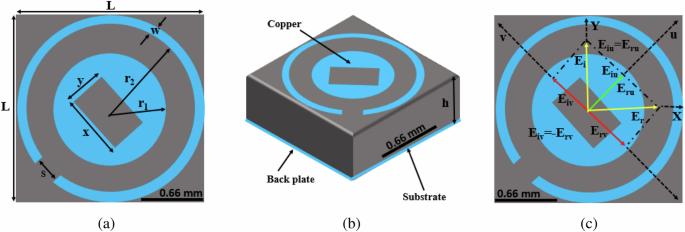Multi-band ultrathin reflective metasurface for linear and circular polarization conversion in Ku, K, and Ka bands
引用次数: 0
Abstract
Linear polarization (LP) and circular polarization (CP) holds paramount importance in Ku, K, and Ka bands for satellite based communication, and remote sensing applications. Satellite based remote sensing applications face challenges like atmospheric attenuation, noise & interference, and signal degradation. Moreover, satellite based communication application demands CP in two distinct, non-adjacent frequency bands with orthogonal polarizations at greater oblique angles, considering the unpredictable incidence angles of electromagnetic (EM) waves. Addressing these challenges, an innovative metasurface polarization converter is proposed to operate efficiently across the Ku-band (13.5–18.0 GHz), K-band (18.0–26.5 GHz), and Ka-band (26.5–38.5 GHz) frequency ranges. The converter achieves left-handed circular polarization (LHCP) in the Ku- and Ka-bands within the frequency ranges of 14.57–15.65 GHz and 27.47–33.85 GHz for y-polarized incident EM waves. Additionally, it provides right-handed circular polarization (RHCP) in the K- and Ka-bands at 17.27–23.92 GHz and 35.87–38.32 GHz for y-polarized incident EM waves. The LP conversion ratio exceeds 95% in the frequency bands of 15.97–16.85 GHz, 24.70–26.65 GHz, and 34.37–35.45 GHz for y-polarized, LHCP, and RHCP incident EM waves, respectively. The metasurface exhibits robust performance up to incidence angles of 45 degrees under oblique conditions. Experimental validation using traditional board-circuit manufacturing demonstrates close agreement between measured co- and cross-polarized reflection coefficients and simulations in the 13.5–18 GHz, and 24–38.5 GHz frequency range. Thin metasurface with a thickness of only 0.64 = 0.013λo mm, the proposed design outperforms existing studies in the literature, establishing its competitive edge in terms of structure and performance. Humayun Zubair Khan and colleagues design a thin and efficient metasurface for polarisation conversion. Their solution can operate to up to 45-degree incidence angles and is suitable for satellite communications which use separated frequency bands with orthogonal circularly polarised waves.

用于 Ku、K 和 Ka 波段线性和圆极化转换的多波段超薄反射元表面
线性极化(LP)和圆极化(CP)在 Ku、K 和 Ka 波段的卫星通信和遥感应用中至关重要。卫星遥感应用面临着大气衰减、噪声放大器、干扰和信号衰减等挑战。此外,考虑到电磁波(EM)的入射角难以预测,卫星通信应用需要在两个不同的、不相邻的频段上以更大的斜角进行正交极化。为应对这些挑战,我们提出了一种创新的元表面极化转换器,可在 Ku 波段(13.5-18.0 GHz)、K 波段(18.0-26.5 GHz)和 Ka 波段(26.5-38.5 GHz)频率范围内高效运行。该转换器可在 14.57-15.65 GHz 和 27.47-33.85 GHz 频率范围内的 Ku 波段和 Ka 波段实现左手圆极化(LHCP),适用于 y 极化入射电磁波。此外,它还能在 K 波段和 Ka 波段的 17.27-23.92 千兆赫和 35.87-38.32 千兆赫频率范围内为 Y 偏振入射电磁波提供右旋圆极化(RHCP)。在 15.97-16.85 GHz、24.70-26.65 GHz 和 34.37-35.45 GHz 频段,对于 y 偏振、LHCP 和 RHCP 入射电磁波,LP 转换率分别超过 95%。该元表面在入射角为 45 度的倾斜条件下表现出稳定的性能。使用传统电路板制造工艺进行的实验验证表明,在 13.5-18 GHz 和 24-38.5 GHz 频率范围内,测量的同极化和跨极化反射系数与模拟结果非常接近。薄元表面的厚度仅为 0.64 = 0.013λo 毫米,所提出的设计优于文献中的现有研究,从而确立了其在结构和性能方面的竞争优势。Humayun Zubair Khan 及其同事设计了一种用于极化转换的薄而高效的元表面。他们的解决方案入射角可达 45 度,适用于使用正交圆极化波分离频带的卫星通信。
本文章由计算机程序翻译,如有差异,请以英文原文为准。
求助全文
约1分钟内获得全文
求助全文

 求助内容:
求助内容: 应助结果提醒方式:
应助结果提醒方式:


